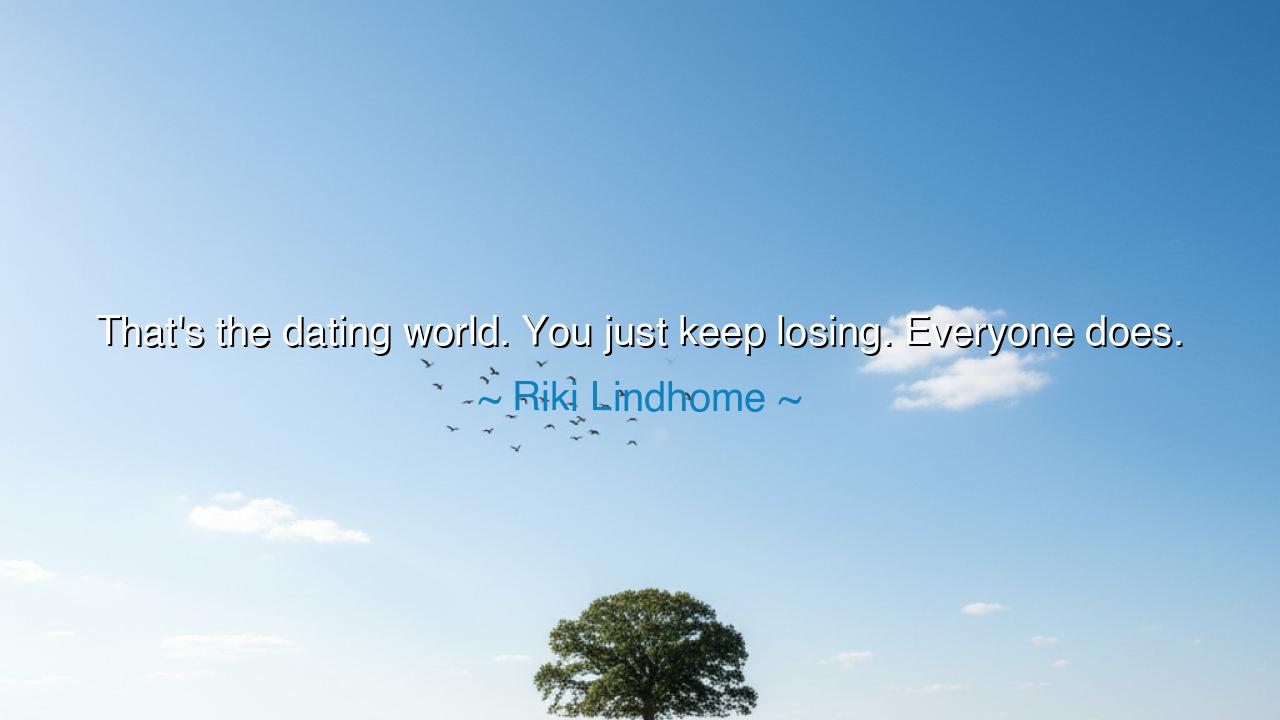
That's the dating world. You just keep losing. Everyone does.






In the marketplaces of the heart, where lanterns sway and promises are bartered for sighs, a stark proverb is spoken: “That’s the dating world. You just keep losing. Everyone does.” Hear the flint in those words. They do not sneer at love; they honor its cost. The saying teaches that courtship is a field where most seeds do not sprout, where the math of many beginnings leads by design to a single enduring bond—or to a season of solitude used well. Failure is not an accident here; it is the roadbed. We travel it to learn the shape of our own soul and the boundary of our dignity.
To call it the dating world is to name a territory with its own weather—bright evenings, sudden storms, and long droughts that make a single kindness feel like spring. In this country, we audition tenderness and learn to speak desire without conquest. But the laws are severe: one “no” outweighs ten “maybes,” and the heart, like a craftsman, discards a hundred drafts to keep one true. Thus, “you keep losing” does not mean you are unworthy; it means you are participating in a winnowing that protects both parties from the counterfeit fit.
Consider how apprentices once learned a trade. The potter shattered misfired bowls to keep the kiln honest; the archer’s quiver emptied into the hillside long before an arrow sang true. So it is with affection. Rejection is the kiln’s crack, the arrow in the sod; it shows us where our aim shakes—our impatience, our fear, our scripts inherited from places that did not love us well. Each “loss” maps another contour of the self, and if we refuse the map, we wander in circles with a smile painted on.
Take a story fit for the annals. A woman named Lila lived through a string of brief romances—four months of laughter, then a quiet retreat; seven weeks of brilliance, then a text that thinned to silence. She began to believe the chorus: Everyone does lose; perhaps loss is her name. An elder asked her to keep a ledger—not of partners, but of lessons. In one margin: “I abandon my boundaries when dazzled.” In another: “I mistake intensity for care.” By the end of a year she had not found a spouse, but she had found her posture—upright, soft-spoken, unbending about respect. The next time the spark came, she recognized something new: steadiness that did not need to be convinced. What she had called losing had been a curriculum; her heart had graduated with honors grief could not erase.
History offers a sterner mirror. The poet Rilke counseled a young lover to “love the questions,” to let relationships be training for the great solitude out of which true union is born. And consider Beethoven, who loved greatly yet married no one. From losses—some romantic, many existential—he forged music that taught the world how to hope. Their lives do not preach despair; they instruct us to harvest meaning from thwarted desire, to build a self that can host love without collapsing under it.
What, then, is the lesson stitched into the proverb? First, that “you keep losing” is not an indictment but an expectation—like a sailor expecting waves. Second, that resilience is not numbness; it is the art of metabolizing disappointment into clarity. Third, that the aim is not to stop losing, but to lose the wrong things: lose the need to perform, lose the panic of scarcity, lose the habit of staying where respect is rationed. In this way the losses prune the tree so fruit can grow.
Let your actions be simple and steel-true. Set a rule of self-respect you will not negotiate. After each ending, write the smallest honest lesson and carry it forward; do not carry the blame. Prefer long conversations to loud chemistry; choose patterns over promises. Keep a life rich in craft, kin, and service so that the dating world becomes one garden among many—not the whole country. And when another’s “no” arrives, bow to it like weather; it is not the sky judging you, only a cloud passing on its own pilgrimage. Walk on. Love is a long road where everyone does stumble, and where the ones who arrive are simply the ones who learned to rise with tenderness—for themselves first, and then, at last, for the one who stays.






AAdministratorAdministrator
Welcome, honored guests. Please leave a comment, we will respond soon